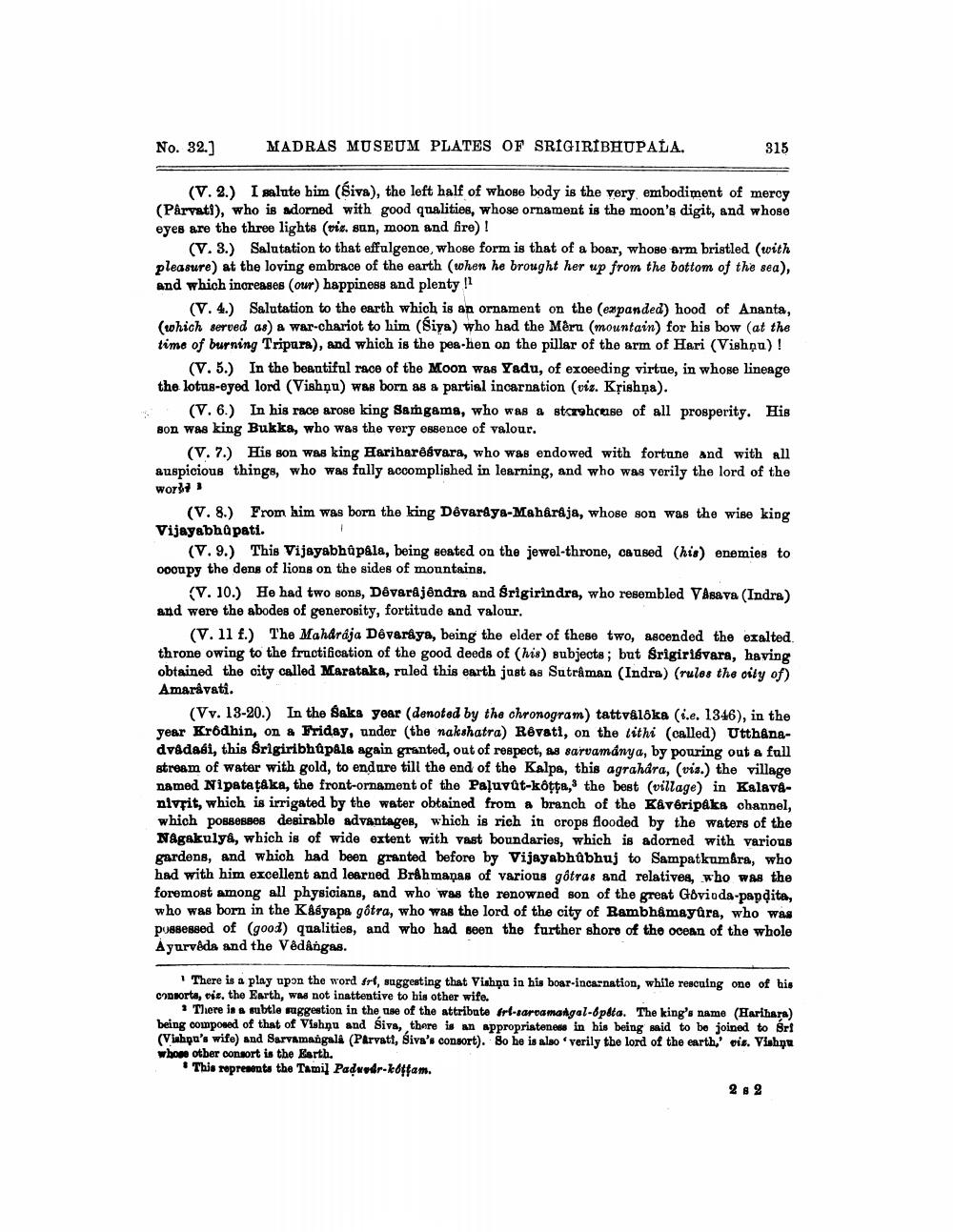________________
No. 32.]
MADRAS MUSEUM PLATES OF SRIGIRIBHUPALA.
315
(V. 2.) I salute him (Siva), the left half of whose body is the very embodiment of mercy (Parvati), who is adorned with good qualities, whose ornament is the moon's digit, and whose eyes are the three lights (vit. san, moon and fire)!
(V. 3.) Salutation to that effulgence, whose form is that of a boar, whose arm bristled (with pleasure) at the loving embrace of the earth (when he brought her up from the bottom of the sea), and which increases (our) happiness and plenty !
(V. 4.) Salutation to the earth which is an ornament on the expanded) hood of Ananta, (which served as a war-chariot to him (Siya) who had the Meru (mountain) for his bow (at the time of burning Tripura), and which is the pea-hen on the pillar of the arm of Hari (Vishạn)!
(V.5.) In the beantiful race of the Moon was Yadu, of exceeding virtue, in whose lineage the lotus-eyed lord (Vishņu) was born as a partial incarnation (viz. Křishņa).
(V. 6.) In his race arose king Samgama, who was a strahcase of all prosperity. His son was king Bukka, who was the very essence of valour.
(V. 7.) His son was king Hariharêsvara, who was endowed with fortune and with all auspicious things, who was fully accomplished in learning, and who was verily the lord of the worst 1
(V. 8.) Prom him was born the king Devaraya-Maharaja, whose son was the wise king VijayabhQpati.
(V. 9.) This Vijayabhupala, being seated on the jewel-throne, caused (his) enemies to opoupy the dens of lions on the sides of mountains.
(V. 10.) He had two sons, Dévarajêndra and Srigirindra, who resembled Vasava (Indra) and were the abodes of generosity, fortitude and valour.
(V. 11 f.) The Maharaja Devaraya, being the elder of these two, ascended the exalted. throne owing to the fructification of the good deeds of (his) subjects; but Srigirisvara, having obtained the city called Marataka, ruled this earth just as Sutraman (Indra) (rules the city of) Amaravati.
(Vv. 13-20.) In the Saka year (denoted by the chronogram) tattvalóka (i.e. 1346), in the year Krodhin, on a Friday, under the nakshatra) Rêvati, on the tithi (called) Utthangdvadasi, this Srigiribhupals again granted, out of respect, As sarvamánya, by pouring out a full stream of water with gold, to endare till the end of the Kalpa, this agrahara, (vis.) the village named Nipatataka, the front-ornament of the Paluvut-kotta, the best (village) in Kalavanivrit, which is irrigated by the water obtained from a branch of the Kaveripaka channel, which posgebees desirable advantages, which is rich in crops flooded by the waters of the Nagakulya, which is of wide extent with vast boundaries, which is adorned with various gardens, and which had been granted before by Vijayabhubhuj to Sampatkumara, who had with him excellent and learned Brahmanas of various gôtras and relatives, who was the foremost among all physicians, and who was the renowned son of the great Govioda-papdita, who was born in the Kasyapa gôtra, who was the lord of the city of Rambhimayura, who was Puesessed of (good) qualities, and who had seen the further shore of the ocean of the whole Ayurveda and the Vedangas.
There is a play upon the word frt, suggesting that Vishņu in his boar-incarnation, while rescuing one of his Consorta, vis, the Earth, was not inattentive to his other wife.
1 There is a subtle ruggestion in the use of the attribute fri-sareamangal-Opšta. The king's name (Harihara) being composed of that of Vishnu and Siva, there is an appropriateness in his being said to be joined to Srl (Vishna's wife) and Sarvamangala (Parvati, Siva's consort). So he is also verily the lord of the earth,' vie. Vishnu whore other consort is the Earth. This represents the Tamil Padwydr-koffam.
2 & 2




